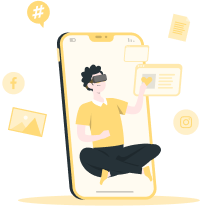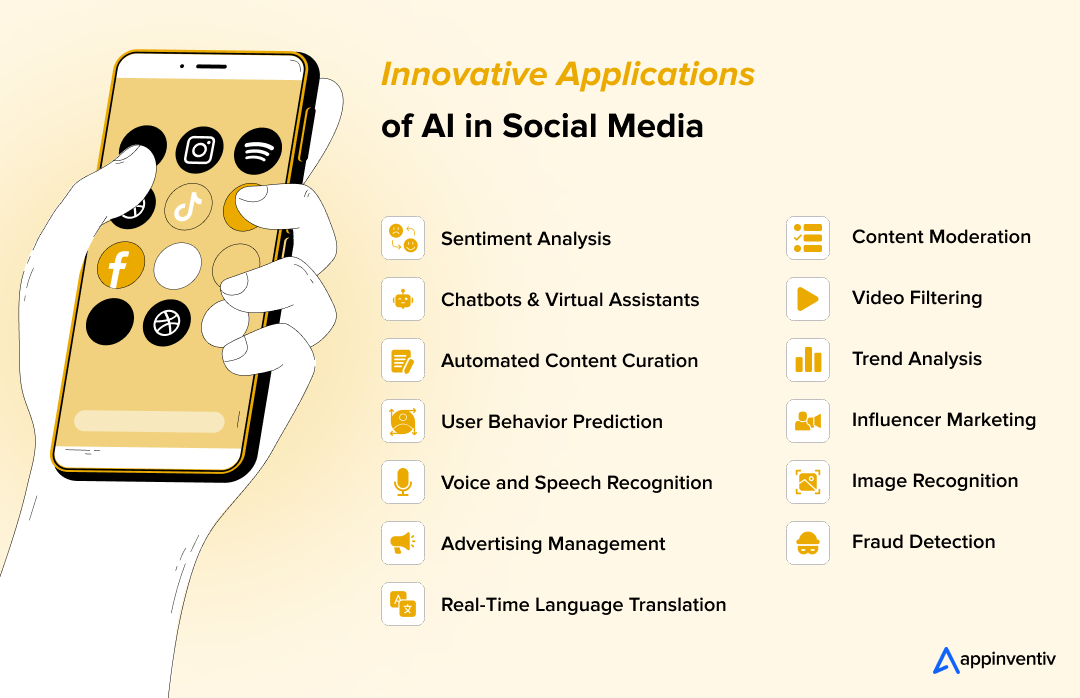- AI in Social Media Market Size
- Why Do You Need AI in Social Media?
- Users Expect Hyperpersonalized Content
- Automate Workflow
- Making Informed Business Decisions
- Enhance User Engagement
- Improves User Retention Rate
- Applications of AI in Social Media
- Sentiment Analysis
- Chatbots and Virtual Assistants
- Trend Analysis
- User Behavior Prediction
- Voice and Speech Recognition
- Advertising Management
- Influencer Marketing
- Content Moderation
- Video Filtering
- Content Generation
- Automated Content Curation
- Image Recognition
- Fraud Detection
- Real-Time Language Translation
- Unveiling the Benefits of AI in Social Media
- Personalized Content Recommendations
- Improved Search Results
- Global Connectivity through Real-time Translation
- Enhanced Security with Spam and Malware Detection
- Harmful Content Moderation
- User Privacy Protection
- Ideal Customer Identification
- Customized Advertising with Personalized Ad Campaigns
- Precision in ROI Measurement
- Data-Driven Content Creation
- Efficient Customer Support
- Streamlined Contests and Giveaways
- Informed Decisions with Data-Driven Strategies
- Analyzing Current and Future Trends of AI in Social Media
- AI-Driven Chatbots
- Augmented Reality (AR) in Social Media
- Hyper-Personalization
- Advanced Generative AI for Content Creation
- Real-Time Engagement Analysis
- Enhanced Visual Content Recognition
- Ethical AI and Transparency
- AI-powered Social Media Analytics
- Deepfake Detection
- Emotion AI for Deeper User Insights
- AI as a Tool for Regulatory Compliance and Content Governance
- Personal AI Agents for Social Media Navigation
- Decentralized AI Operations
- Predictive AI for Proactive Content Strategy
- Challenges of Integrating AI in Social Media
- 1. Data Privacy and Security Concerns
- 2. Bias and Fairness in AI Algorithms
- 3. High Implementation Costs
- 4. Integration Complexities
- 5. Keeping Pace with AI Advancements
- 6. User Acceptance and Trust
- 7. Regulatory Compliance
- How Can Appinventiv Help You Leverage AI in Social Media?
- FAQs
Artificial Intelligence has emerged as a transformative force in the 21st century, revolutionizing every aspect of our daily lives. Its most pronounced influence can be observed in the social media ecosystem, which has become the central online communication and connectivity stage.
AI in social media now stands as a powerful driving force, reshaping the dynamics of our online interactions. It influences everything from automated content moderation and tailored content recommendations to the advertisements that flood our feeds.
According to Backlinko, social media leaders leveraging AI in social media marketing strategies and personalized recommendations are increasingly influencing 82% of the population in Europe and North America.
However, integrating AI in social media platforms is a strategic move that can revolutionize how companies engage with their audience and the market.
- AI enables businesses to automate and improve their social media presence through content moderation, customer support with chatbots, and streamlined audience targeting.
- AI enables companies to stay ahead of technological advancements, ensuring their social media app is a dynamic, engaging, and data-informed tool for business growth and customer engagement.
AI in Social Media Market Size
The AI in Social Media Market, projected to grow from USD 2.69 billion in 2025 to USD 9.25 billion by 2030 at a CAGR of 28.04%, presents significant business opportunities across various sectors. (Source: Mordor Intelligence)
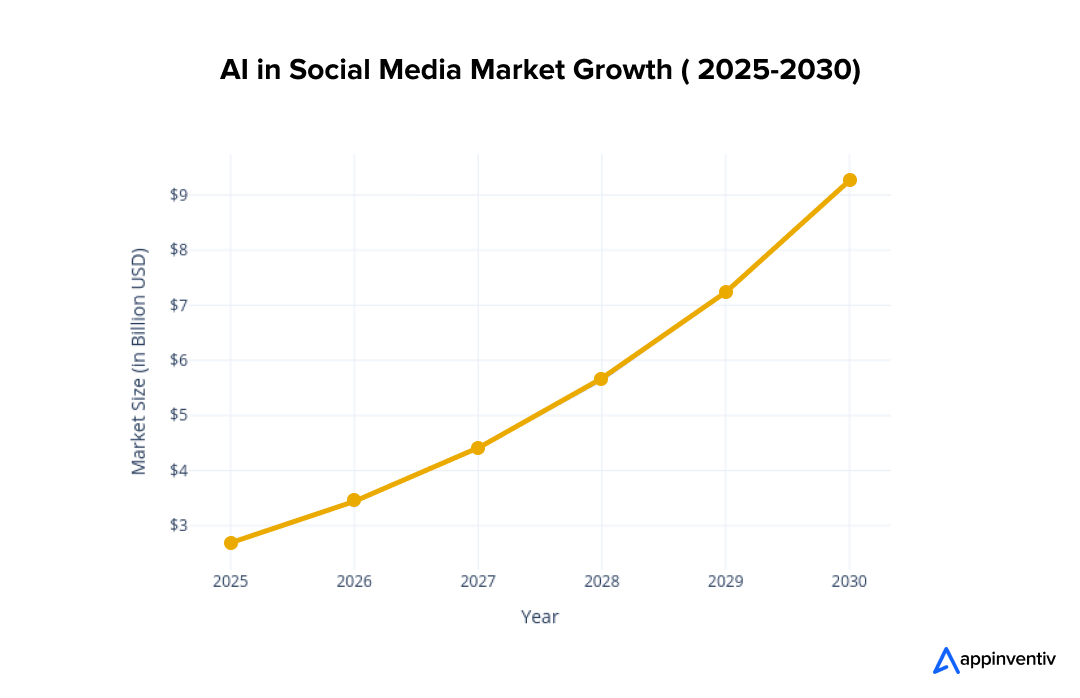
This blog will help you understand everything related to AI in social media and how this technology can transform how we engage and interact in the digital age. We will also explore real-life examples of how social media organizations leverage AI to achieve maximum ROI and explore this ecosystem’s current and future trends. So, without further ado, let’s dive right into the details.
Why Do You Need AI in Social Media?
Businesses harness the power of AI algorithms and machine learning models to enhance various aspects of social media, such as user engagement, content creation, and data interpretation. Using AI for social media marketing mainly enhances user interactions, simplifies marketing operations, and empowers informed, data-backed decision-making. Social media and Artificial Intelligence together make the social media experience more personalized, efficient, and engaging for users and businesses:
Users Expect Hyperpersonalized Content
AI algorithms can analyze user behavior and preferences to deliver tailored content and recommendations. This helps users discover new and interesting content and connect with people and businesses they are most likely interested in.
Automate Workflow
AI can also help businesses to automate and streamline their marketing efforts. For example, AI-powered tools can help to identify and target ideal customers, create personalized ad campaigns, and measure the ROI of marketing campaigns.
Making Informed Business Decisions
The combination of personalization, efficiency, and informed decision-making is the driving force behind AI’s transformative impact on social media. It has become the defining characteristic of AI social media marketing, bringing in an era of smarter and more engaging online experiences.
Enhance User Engagement
As per artsmart.ai, businesses that have integrated AI into their social media strategies have reported substantial improvements, with engagement rates rising by 15 to 25%, contributing to higher revenues.
Improves User Retention Rate
According to artsmart.ai, as of 2024, there are 5.17 billion global social media users, representing 63.7% of the world’s population. This vast audience is increasingly being served with AI-powered content recommendations, with over 80% of these suggestions generated by artificial intelligence. This technology significantly enhances user retention rates.
Given these reasons, social media businesses that have not yet started leveraging AI should consider it imperative to adopt these technologies now. This strategic move is crucial to capitalize on the growing market and enhance their competitive edge.
Applications of AI in Social Media
AI has a significant influence on the landscape of social media. It can simply help in enhancing personalization, efficiency, and content relevance. There are multiple applications of AI in social media that help enrich user experiences and streamline operations. Let us look at the multiple applications to understand the impact of artificial intelligence on social media:
Sentiment Analysis
AI analyzes the sentiment of social media posts and comments. This helps businesses understand the general mood and emotions behind content and also assists in monitoring customer feedback and reactions.
Real Example: Twitter Deploys Sentiment Analysis Algorithms
Twitter employs sentiment analysis algorithms to determine the emotional tone of users’ tweets. This helps businesses understand people’s feelings about specific topics or brands, allowing for real-time insights into public opinion and sentiment trends.
In 2012, Twitter launched Twindex, a service that deploys sentiment analysis algorithms. It tracks how voters feel and the daily shifts in opinion about presidential candidates. This move showed Twitter getting serious about big data, using massive data analysis to predict politics.
Chatbots and Virtual Assistants
AI-powered chatbots provide users with real-time support and information. They can answer questions, guide users to relevant content, and enhance customer engagement.
Real-Example: Facebook Messenger Deploys AI Chatbot
Facebook Messenger’s AI chatbots boost customer service by quickly responding to inquiries, fostering engagement, and enhancing user experiences. This keeps users active and increases their time on the platform.
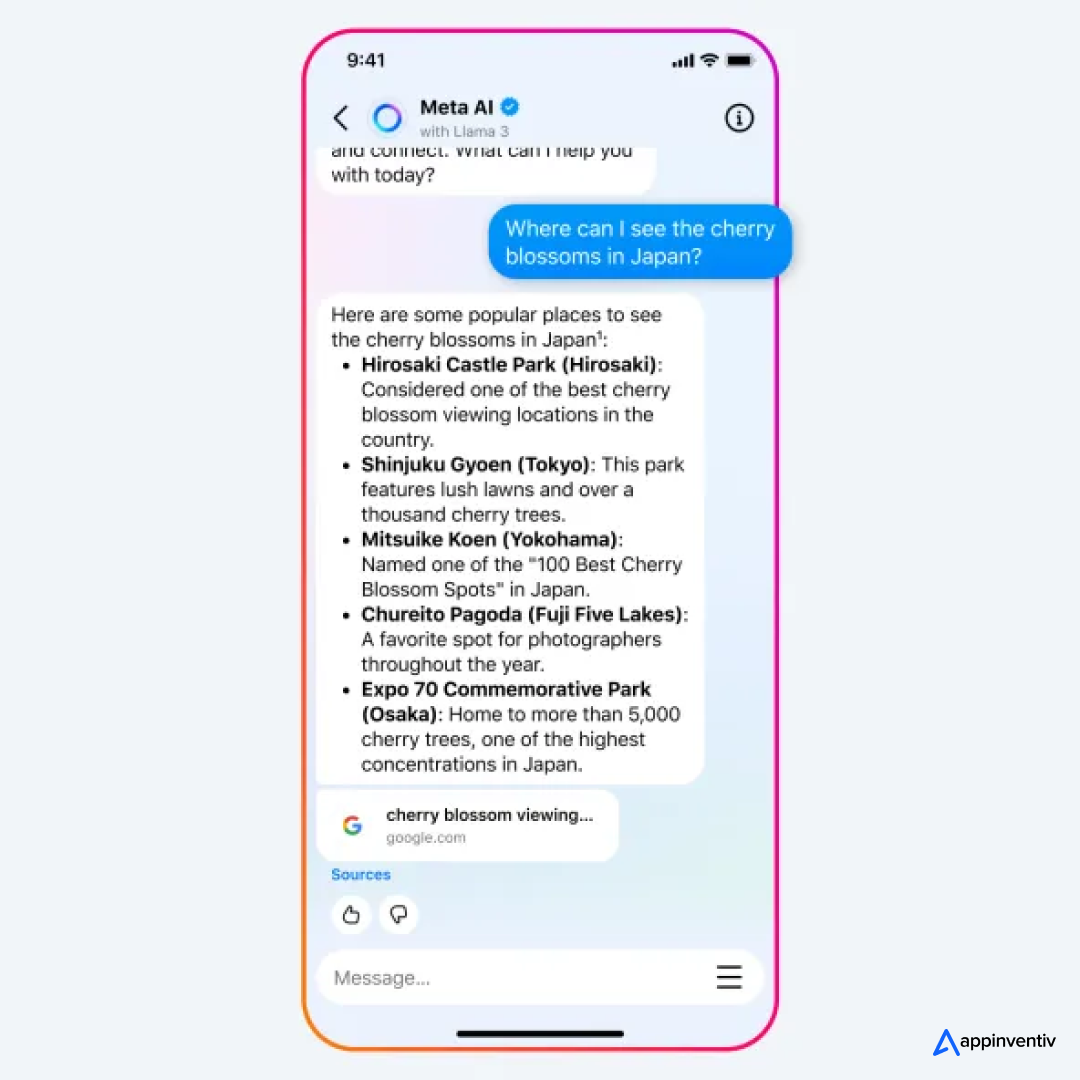
Meta AI is a smart assistant integrated into Messenger that answers users’ questions within chats. It recommends movies, restaurants, and other options based on user preferences. Additionally, Meta AI offers creative support by generating images and ideas on demand.
Trend Analysis
AI is utilized to identify emerging trends and topics among multiple social media conversations. This empowers companies to create content that resonates with their target audience’s interests and conversations.
Real Example: Twitter uses AI for Tracking Trending Hashtags
Twitter uses AI to track trending hashtags and topics, enabling businesses to align their content with popular discussions. Its AI agents automate the monitoring and analysis of Twitter data and deploy NLP and sentiment analysis to assess tweet volume, engagement metrics, and user interactions to determine trending content.
User Behavior Prediction
AI algorithms can predict user behavior by analyzing their past interactions and preferences. This empowers businesses to offer highly personalized content and recommendations, fostering stronger customer engagement and satisfaction.
Real-Example: Facebook Deploys AI for Behavior Prediction
Facebook uses AI to predict user behavior by analyzing past interactions and preferences, and personalizes experiences across its platforms:
- Content Personalization: Facebook’s AI algorithms analyze user interactions based on likes, comments, shares, and time spent on posts. This helps them predict and personalize content that aligns with individual preferences while improving engagement.
- Ad Targeting: Facebook streamlines its advertising targeting system using machine learning. This allows the company to easily estimate the likelihood of a user engaging with a particular ad and determine which ads are shown to which users.
- Predictive Precompute: The business uses Recurrent Neural Networks (RNNs) to enhance users’ feelings and work speed for “predictive precompute.” This method guesses what users will do next to prepare things in advance. This cuts down on wait time and makes everything seem snappier on the platform.
Voice and Speech Recognition
AI-driven speech recognition technology increasingly integrates into social media platforms, enabling voice commands and transcription services for various purposes. This allows features like dictating messages, searching content, or transcribing audio/video for captions, enhancing accessibility and convenience for diverse user needs.
Real-Example: Vyrb Deploy AI-powered Voice Recognition
Vyrb, developed by Appinventiv for Innovative Eyewear, is an innovative social media platform optimized for Bluetooth wearables, particularly glasses. It enables users to send and receive audio messages and create voice-based posts for platforms like Twitter and Facebook, offering a hands-free, seamless experience.
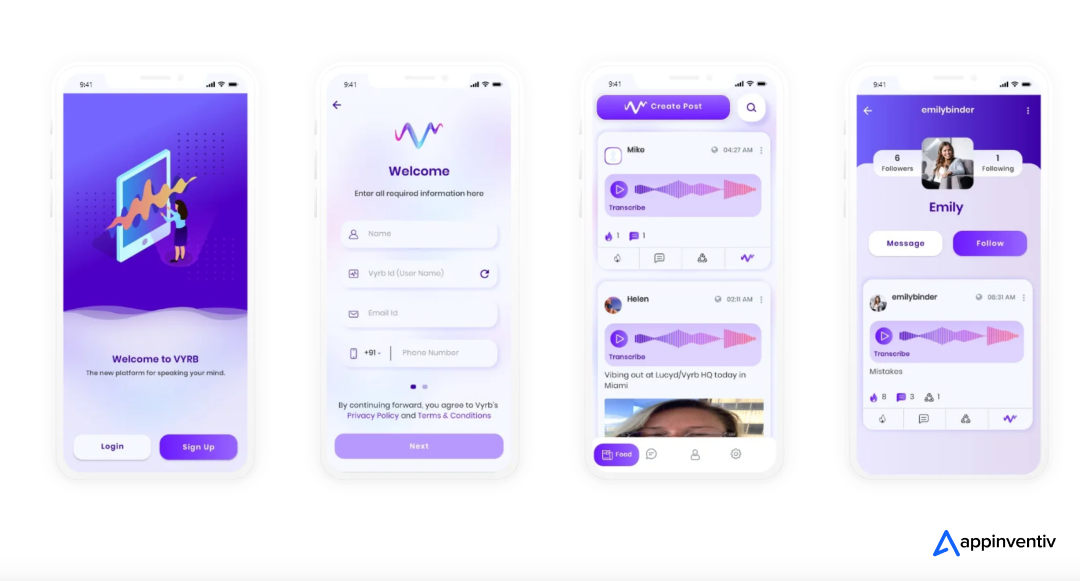
Features like Integration of voice-command functionality with Siri and Google Assistant, autoplay, and audio manipulation tools drive 50,000+ downloads, indicating significant user adoption.
Advertising Management
AI social media marketing tools streamline advertising by analyzing customer data and targeting by creating and delivering tailored ad variations to specific audience segments, maximizing relevance and impact. AI-powered campaign adjustments enhance efficiency, reduce costs, and boost conversion rates, fostering stronger connections between brands and their audiences.
Real-Example: Facebook Deploys AI for Ad Delivery
Facebook’s ad platform utilizes AI to optimize ad delivery based on user behavior. It is one of the simplest platforms for analyzing AI’s impact on social media. Here’s an overview of how AI functions:
- Personalized Ad delivery based on recommendations: Meta analyzes user metrics, including browsing behavior, engagement patterns, and interests, through the Deep Learning Recommendation Models (DLRMs). This helps Meta deliver highly personalized ads while increasing engagement and conversion rates.
- Real-Time Ad Auction Optimization: Facebook’s AI system evaluates ads based on the advertiser’s bid, estimated action rate, and Ad quality to determine which ads are shown to users, ensuring that high-quality, relevant ads reach the appropriate audience.
Influencer Marketing
AI is revolutionizing influencer marketing by automating tricky tasks and providing insights rooted in data to make campaigns more efficient and effective. AI helps pick influencers quicker and ensures they’re more relevant and real. AI makes running campaigns smoother, not just for finding peeps and guessing outcomes. It allows brands to get their influencer marketing game on point, boosts their returns on investment, and helps them make real connections with the folks they want to reach.
Real-Example: AspireIQ
AspireIQ uses AI to match brands with influencers whose audience demographics align with the campaign’s target market. Explore how AspireIQ leverages AI to streamline influencer marketing by enhancing discovery, collaboration, and campaign management:
- AI-Powered Discovery: The company deploys AI to filter influencers based on criteria like location, content aesthetics, and engagement. Further, it employs an AI reverse image search tool to find creators whose visual content matches a brand’s established style.
- Automated Campaign Workflows: AspireIQ’s AI system automates repetitive tasks like sending follow-up emails, managing shipments, and approving content, saving time and reducing effort.
- Real-Time Performance Monitoring: AspireIQ’s AI-powered analytics tools track key metrics like reach, engagement, and ROI, allowing brands to monitor the success of their campaigns in real time.
Content Moderation
Content moderation is one of the leading applications of AI in social media. AI-driven bots enable businesses to detect, assess, and manage vast amounts of user-generated content in real time. They also scan and filter content for spam, guideline violations, or inappropriate material.
Real-Example: Instagram
Instagram employs AI to block comments that violate its guidelines. It also relies on AI to check its content and ensure it fits the Community Rules. These smart systems are always on the lookout for posts that break the rules, such as mean comments, unwanted naked pics, and super violent images. Instagram employs AI to identify and mitigate harmful behaviors, such as bullying, by prompting users to reconsider posting potentially offensive comments.
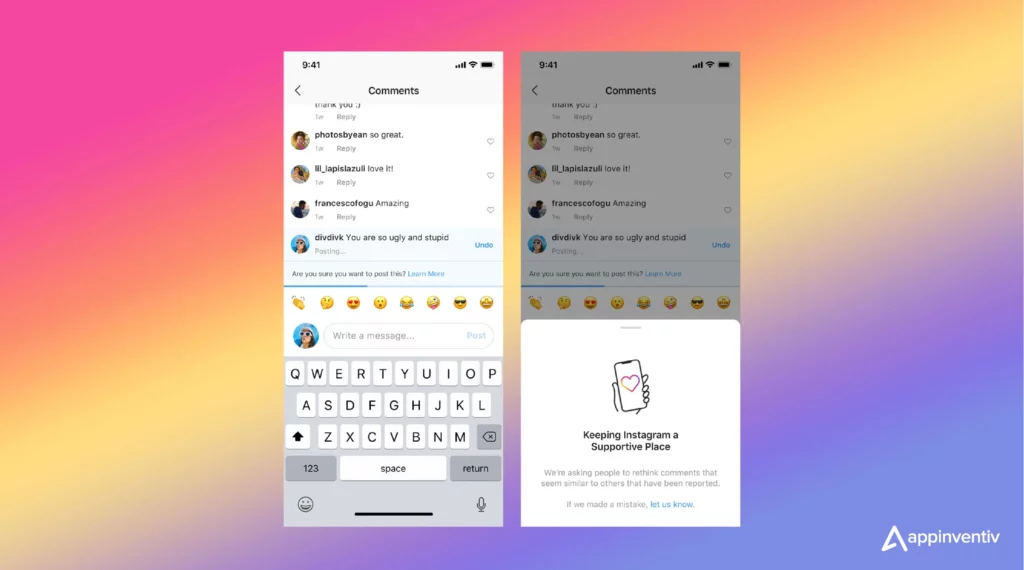
Video Filtering
AI in facial recognition and image analysis software recognizes facial structures and identifies users applying overly edited filters, ensuring content quality and authenticity.
Real-Example: TikTok
TikTok employs AI-based facial recognition and image analysis to identify users who apply excessive and unnatural filters to their videos. It relies on cutting-edge AI tech, such as computer vision and face recognition, to check and tweak facial features in real time. This allows it to apply AI Face, AI Style, and AI Manga filters.
These filters can turn users into different characters or styles, like golden statues or manga figures, by spotting and changing facial traits. This filtering system makes videos look better and gives users lots of creative options to play with.
Content Generation
AI is now capable of generating creative content, including text, images, and videos, tailored to the preferences of specific audiences. It allows companies to write posts, create pictures, and shape messages for different groups of people. Using tools like GPT for writing and DALL·E for images, AI can quickly create top-notch captions, pictures, and even videos. AI doesn’t just create content—it also impacts how well that content performs. It helps marketers make choices based on data by improving and testing different versions.
Real Example: Pinterest
Pinterest uses AI to create personalized content suggestions that align with user interests based on past interactions. This enhances user engagement and also aids in maintaining a steady stream of relevant content. One cool thing they’ve done is Pinterest Canvas, a system that turns text into images. This helps advertisers make eye-catching backgrounds for their product shots, which makes ads work better. On top of that, Pinterest uses AI to create new stuff to make its platform more inclusive.
Automated Content Curation
AI helps in curating content by sorting through massive amounts of media to find the most relevant, interesting, and valuable content for users. AI algorithms review many media, such as articles, videos, pictures, and posts. They look at what users like, how they act, what’s popular, and how people interact with content.
This helps AI determine and select the most interesting, engaging, and high-quality content for each user or group. Eliminating irrelevant material saves people time and improves their experience by giving them personalized content they’ll find useful.
Real Example: Flipboard
Flipboard uses AI to analyze user preferences and reading habits to curate a personalized news feed, ensuring that users are more likely to engage with the content on their feed. Flipboard uses AI to improve its content curation. The AI systems on the platform pull out topics from content, eliminate duplicate information, and ensure variety to provide users with relevant and high-quality content.
Also, Flipboard’s own Interest Graph uses AI to show individual content based on how people interact with over 30,000 topics, always changing to fit users’ interests. This use of AI allows Flipboard to give users a custom-made and interesting content experience.
Image Recognition
AI technologies are increasingly sophisticated in analyzing images to recognize faces, objects, and emotions, enabling richer interactions and functionalities. These capabilities enhance interactions by powering functionalities such as targeted advertising, accessibility tools (e.g., describing images for visually impaired users), and immersive features like augmented reality filters.
Real Example: Snapchat
Snapchat extensively leverages AI in its image recognition features to enhance user interaction and engagement. The company utilizes image recognition to apply filters and suggest tags, improving user experiences and engagement through interactive and fun elements. AI-powered computer vision and deep learning algorithms allow Snapchat to identify and examine facial landmarks, objects, and scenes in photos and videos. The technology produces interactive lenses and filters that constantly change according to users’ facial expressions and movements to deliver a dynamic augmented reality experience.
Fraud Detection
AI and machine learning are crucial in identifying and mitigating fraudulent activities on social media platforms, such as fake accounts and spam. By analyzing patterns and inconsistencies in account behavior, AI can flag potentially fraudulent activity before it affects users.
Real Examples: Facebook and Twitter
Platforms like Facebook and Twitter extensively use these systems to maintain the integrity and safety of their user interactions.
- Facebook applies machine learning algorithms, Deep Entity Classification, and SybilEdge to study user behavior patterns, which helps them detect and eliminate fake accounts. Facebook’s ability to identify fake phony behavior has improved substantially through AI tools, where DEC helped eliminate billions of sham accounts.
- Twitter uses AI methods like machine learning algorithms and neural networks to detect and remove bot accounts. The systems evaluate user account features and behaviors to identify authentic users from malicious bots.
Real-Time Language Translation
AI-driven language translation allows users from different linguistic backgrounds to interact seamlessly. AI eliminates language barriers through instantaneous text and speech translation into preferred languages, enabling smooth interaction and collaboration among online global communities. It ensures effortless engagement among diverse groups to exchange ideas and establish connections without needing language translation or language skills.
Real Examples: Twitter and Facebook
Social media platforms like Twitter and Facebook have integrated real-time translation features that will enable posts and comments to be instantly translated, breaking down language barriers and fostering a global conversation. Simply put, AI for social media posts revolutionizes communication by making it universally accessible and connecting people across the globe like never before.
After reviewing the multiple AI examples in social media, let’s examine the benefits it offers businesses worldwide.
“AI is the umbrella term for the algorithms, technologies, and techniques that make machines smart and give marketers superhuman capabilities.”
By Paul Roetzer – Founder, Marketing AI Institute
Unveiling the Benefits of AI in Social Media
Artificial intelligence is rapidly transforming the social media landscape. AI algorithms now power various apps that combining AI and social media marketing, offering features and tools to create more personalized, efficient, and engaging content for users and businesses.
Here are some of the key benefits of AI use in social media:
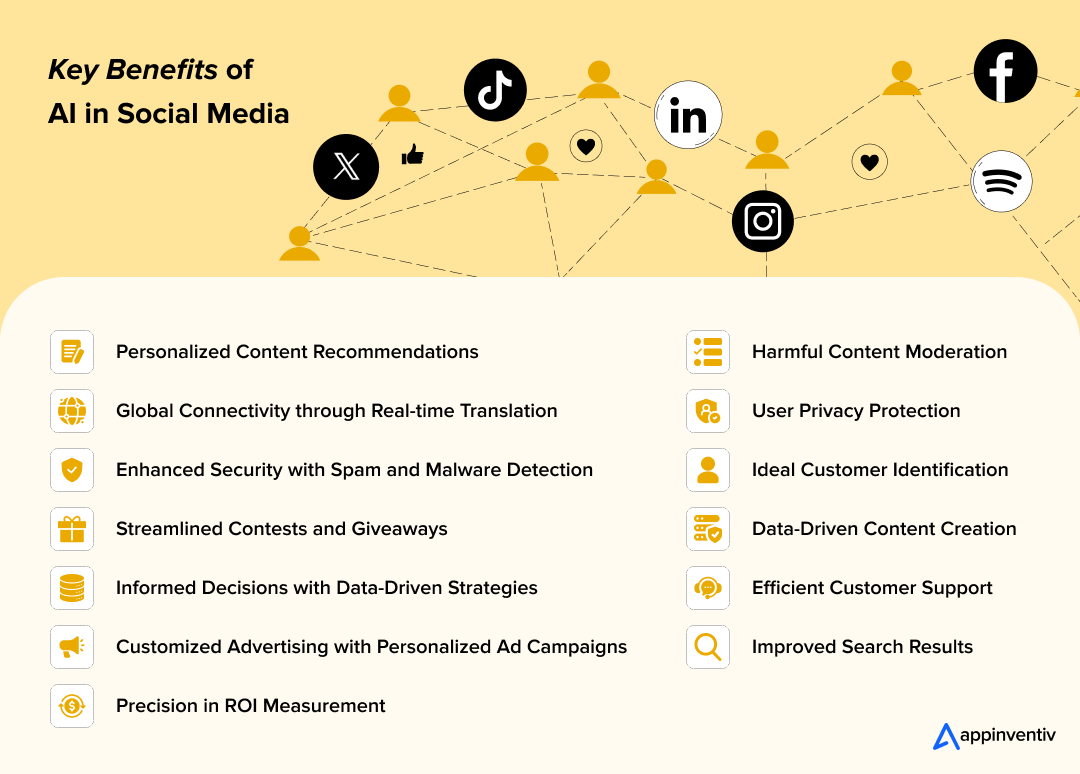
Personalized Content Recommendations
AI can analyze user behavior and preferences to recommend content more likely to interest them. With the rise of artificial intelligence tools, there are tons of social media tools like Sprout Social or HubSpot that can craft personalized content, captions, and posts. This helps your users to discover new and interesting content and save time by avoiding irrelevant content.
Improved Search Results
AI can help to improve the accuracy and relevance of search results. This makes it easier for your users to find the information they seek quickly while saving precious time.
Global Connectivity through Real-time Translation
One of the major benefits of AI use in social media is language translation. AI can translate languages in real-time, making it easier for your users to connect with people worldwide.
Enhanced Security with Spam and Malware Detection
AI for social media platforms can be used to detect and remove spam and malware. This helps to create a safer and more secure environment for your users.
Harmful Content Moderation
AI can be used to identify and remove harmful content from social media platforms, such as hate speech and violence. This helps to create a more positive and inclusive environment for your users.
User Privacy Protection
AI can be used to protect user privacy by encrypting data and developing new technologies that preserve privacy.
Ideal Customer Identification
AI can be used to analyze user behavior and preferences data to identify and target ideal customers. This helps you to target the right people with the right marketing efforts.
Customized Advertising with Personalized Ad Campaigns
AI can be used to create personalized ad campaigns tailored to individual users’ interests. This helps you to increase the effectiveness of your marketing campaigns.
[Also Read: How Will AI Improve Customer Experience in 2025?]
Precision in ROI Measurement
AI can be used to track and measure the results of marketing campaigns. This data can be used to identify which campaigns are performing well and make necessary adjustments.
Data-Driven Content Creation
AI can analyze data on user engagement to identify the types of content that their target audience is most interested in. It is one of the benefits of AI in social media that helps businesses create and share content more likely to be seen, liked, and shared.
Efficient Customer Support
AI-powered chatbots can provide 24/7 customer support, responding to customer inquiries promptly and efficiently. This helps you to improve their customer satisfaction and loyalty.
Streamlined Contests and Giveaways
AI can be used to run social media contests and giveaways more efficiently and effectively. For example, AI can be used to automatically select winners and distribute prizes.
Informed Decisions with Data-Driven Strategies
AI social media marketing, combined in a tool can help businesses collect and analyze social media performance data. This data can be used to identify areas for improvement and develop more effective social media strategies. For example, businesses can use social media analytics data to determine which types of content are performing well, which channels drive the most traffic, and which influencers generate the most engagement.
Analyzing Current and Future Trends of AI in Social Media
To stay ahead in the dynamic field of AI in social media, understanding both current trends and anticipating future developments is crucial. Here’s an overview of the trends that are shaping the industry in 2025 and beyond:
Let’s delve into the latest trends and what they mean for businesses:
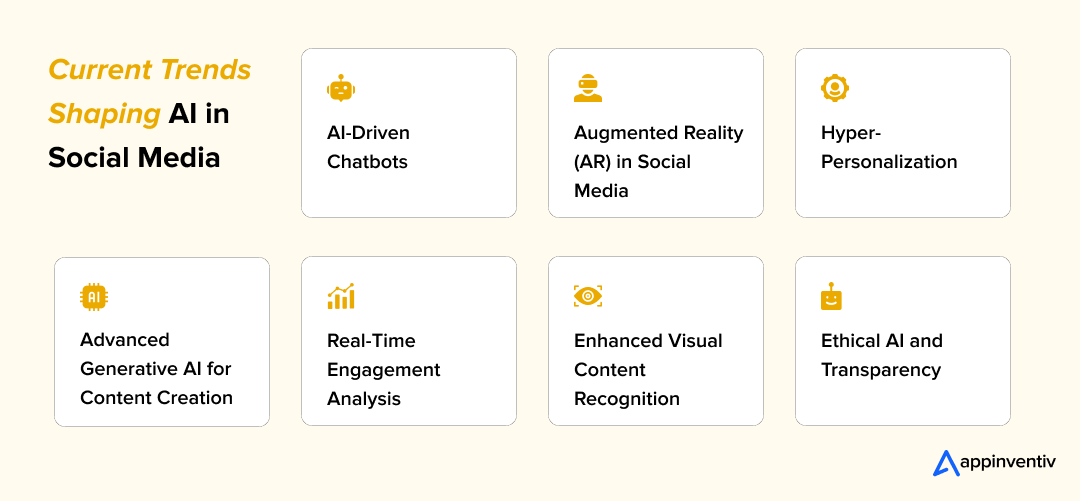
AI-Driven Chatbots
AI-powered chatbots have revolutionized social media customer service by providing instant responses, streamlining inquiries, and offering personalized assistance. Voice bots driven by AI are also gaining popularity, allowing users to engage with the social media channel through voice commands and responses. This trend of AI for social media has prompted businesses to invest in chatbots, enhancing customer engagement and providing 24/7 support.
Augmented Reality (AR) in Social Media
AR has revolutionized social media, making it interactive and engaging. Businesses are leveraging AR to engage users through interactive advertising campaigns and branded AR experiences. Platforms like Instagram and Snapchat offer AR filters that businesses use to boost brand visibility and increase user engagement.
Hyper-Personalization
AI is revolutionizing personalization by delivering hyper-personalized content and recommendations based on user preferences and behavior. This trend highlights the role of artificial intelligence in social media market lookup and presents a unique opportunity for businesses to engage users on a one-to-one level, resulting in increased user satisfaction and loyalty.
Advanced Generative AI for Content Creation
The use of generative AI has evolved from basic content creation to generating highly sophisticated and contextually relevant multimedia content, including videos, graphics, and interactive elements. This AI capability enables brands to create engaging and diverse content at scale, tailored to the choices of their target audiences.
Real-Time Engagement Analysis
AI tools can now analyze social media interactions in real time, providing brands with immediate feedback on the effectiveness of their posts, campaigns, and user engagement strategies. This includes emotional analysis, which can interpret the sentiment behind comments and reactions, allowing brands to adjust their strategy dynamically.
Enhanced Visual Content Recognition
AI’s role in image and video analysis has deepened, with more accurate recognition of objects, scenes, and activities. This technology enhances user experience through smarter content filtering and search capabilities and aids in better ad targeting and content relevance.
Ethical AI and Transparency
As users become more aware of how their data is used, there is a significant push towards ethical AI practices. This includes transparent AI operations where users can understand and control how their data is being used, ensuring their privacy and building trust.
[Also Read: Responsible AI – Addressing Adoption Challenges With Guiding Principles and Strategies]
“The pace of progress in artificial intelligence is incredibly fast. Unless you have direct exposure to groups like DeepMind, you have no idea how fast—it is growing at a pace close to exponential.”
By Elon Musk
Coming to the future of AI in social media, let us understand the futuristic trends in detail below:
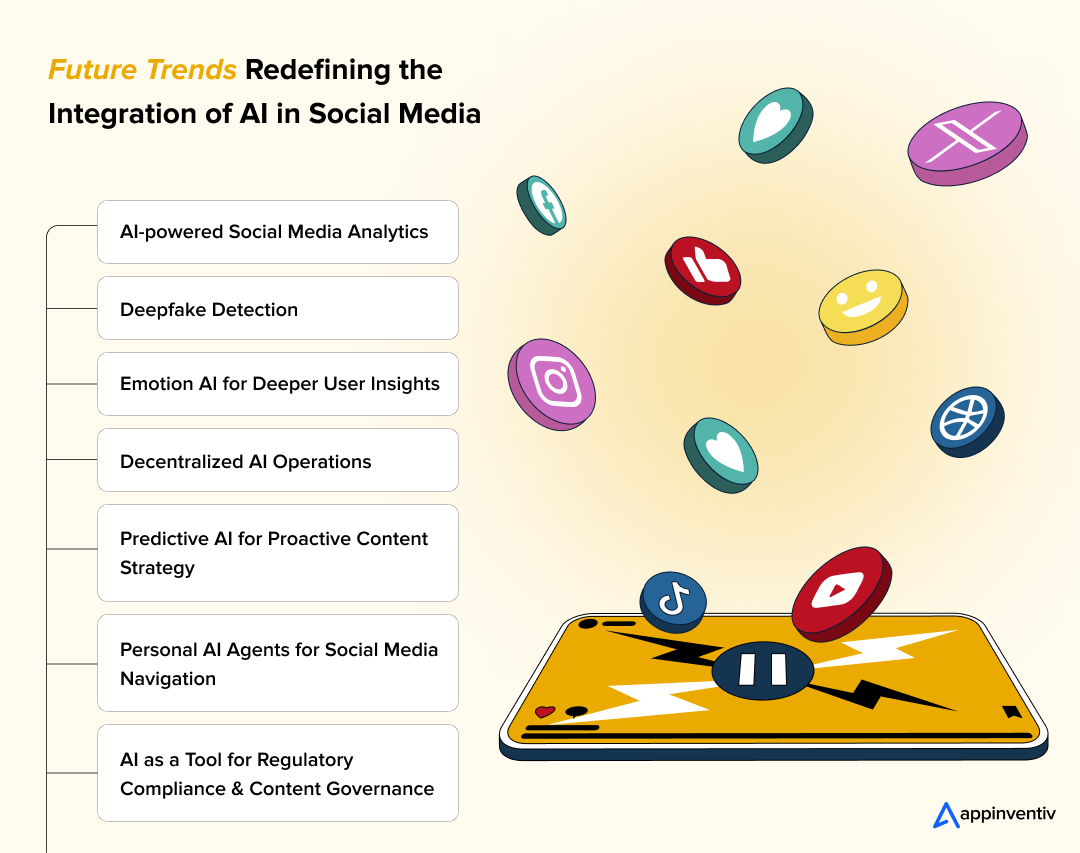
AI-powered Social Media Analytics
AI-powered Social Media Analytics provide social media brands with comprehensive data-driven insights. This enables them to create more effective and precisely targeted marketing campaigns, refine their strategies to align with audience preferences, and optimize their approach to drive higher engagement and user satisfaction.
Deepfake Detection
Deepfake Detection, powered by AI, is crucial in ensuring the authenticity of content shared on social media platforms. By 2025, we can expect 8 million deepfakes shared online, consistently doubling deepfakes every six months. By utilizing advanced artificial intelligence algorithms, this technology can identify and flag manipulated content, such as videos or images, that has been altered to deceive viewers. This capability is of the utmost importance in fostering trust and security within these platforms, as it helps to prevent the spread of misinformation and fraudulent content.
Emotion AI for Deeper User Insights
Future social media and AI platforms will likely incorporate emotion AI technologies beyond text analysis, including voice tone and facial expression analysis in videos and live streams. This will allow for a deeper understanding of user sentiments and more seamless audience engagement. According to National Center for Biotechnology Information, sentiment analysis can achieve up to 87% accuracy in classifying social media emotions, so platforms can reliably interpret user sentiments from live streams or videos.
AI as a Tool for Regulatory Compliance and Content Governance
With increasing concerns about data privacy and misinformation, AI in social media will play a critical role in helping these platforms comply with regulatory requirements. AI can automate the monitoring and moderation of content to ensure adherence to legal standards, assisting platforms to avoid hefty fines and reputational damage.
[Also Read: How to Avoid Compliance Violations While Developing AI Products]
Personal AI Agents for Social Media Navigation
Personal AI agents could become the norm for users, assisting them in managing their social media activities. These agents would help curate content, manage privacy settings, and interact with other users, providing a tailored social media experience based on individual preferences and behaviors.
Decentralized AI Operations
As concerns about concentrated control over AI grow, the future may shift towards decentralized AI models. This approach would allow more stakeholders to participate in the development and management of AI, promoting innovation and reducing biases in AI algorithms.
Predictive AI for Proactive Content Strategy
According to the Global Banking & Finance Review®, in 2025, predictive analytics in social media is expected to increase engagement by 30-40%. AI will analyze user behavior and predict future trends, enabling content creators and marketers to stay ahead of the curve. This predictive capability will allow brands to prepare content that aligns with anticipated changes in user preferences and global trends.
Now that you have a clear answer to the question, ” What is the future of social media with AI?”, let’s examine the step-by-step guide to combining artificial intelligence with social media.
Challenges of Integrating AI in Social Media
AI integration in social media platforms can bring transformative benefits, but it also presents several problems with AI in social media. There are a few noticeable challenges that businesses must navigate carefully. Understanding and preparing strategies to overcome these hurdles is crucial for successful AI integration.
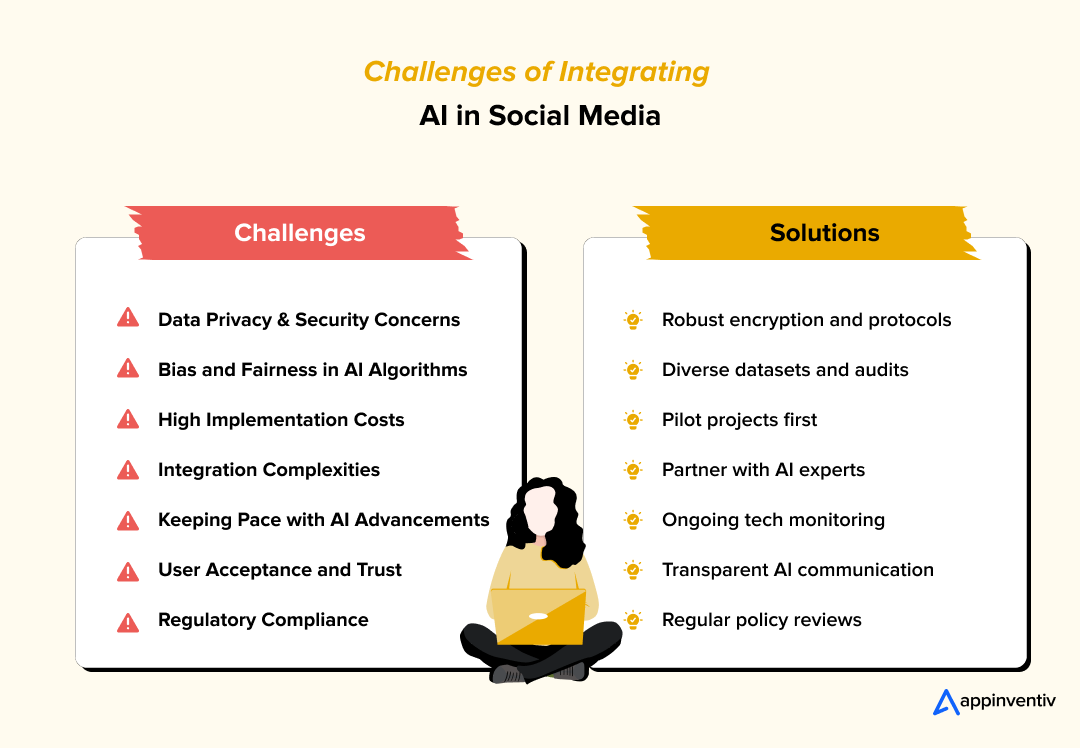
1. Data Privacy and Security Concerns
One of the primary problems with AI in social media challenges is ensuring the privacy and security of user data, as AI systems often require access to large amounts of sensitive information.
Solution: Implement robust data encryption and access protocols. In addition to this, regularly update security measures to protect against evolving threats.
2. Bias and Fairness in AI Algorithms
AI systems can unintentionally learn and increase biases in their training data, leading to unfair outcomes, risks or discrimination.
Solution: Use diverse datasets for training AI models and regularly audit them for bias. Additionally, fairness-enhancing techniques should be employed to ensure AI decisions are equal.
3. High Implementation Costs
Developing, training, and deploying AI can involve significant costs, especially for custom solutions tailored to specific needs.
Solution: Consider starting with smaller, pilot projects to understand the effectiveness before full-scale implementation.
4. Integration Complexities
Integrating AI into existing social media platforms can be technically challenging, requiring significant modifications to the existing architecture.
Solution: Partnering with a reliable social media app development firm with expertise in AI can help manage these complexities effectively, ensuring seamless integration.
5. Keeping Pace with AI Advancements
The field of AI is rapidly evolving, and keeping the integrated systems up to date with the latest developments can be challenging.
Solution: Hire an external team to monitor and integrate the latest AI technologies and practices continuously.
6. User Acceptance and Trust
Users may be skeptical about AI-driven features, especially if they significantly alter the user experience or raise privacy concerns.
Solution: Communicate the benefits of AI features to users and provide them with controls to manage their AI interactions. Furthermore, transparency about how AI uses their data can also help build trust.
7. Regulatory Compliance
AI implementations must comply with various regulations, varying by region and changing over time.
Solution: Regularly review and adapt AI practices to ensure compliance with all relevant laws and regulations, particularly data protection and privacy.
How Can Appinventiv Help You Leverage AI in Social Media?
In a world where social media is the most vital entity of digital communication, integrating artificial intelligence in social media marketing strategies is no longer just a choice; it’s a necessity.
Appinventiv is a leading AI development company that can be your strategic partner in harnessing the power of AI to transform your social media app. Whether you are seeking for a new app from the ground up or looking to seamlessly integrate cutting-edge AI-powered features in your existing app, we can be your strategic partner that can help you meet distinct business requirements while ensuring maximum ROI in this dynamic ecosystem.
Our experts can ensure your social media and AI strategies leverage the latest trends and technologies, keeping you ahead of the competition. By harnessing the full potential of AI for enhanced user engagement, streamlined marketing operations, and data-driven decision-making, our social media app development services can ensure maximum ROI for your social media brand.
Get in touch with us to explore how we can help you leverage AI in the social media industry and transform your business.
FAQs
Q. What is AI in social media?
A. AI for social media involves the use of artificial intelligence technologies on social networking platforms. Its purpose is to improve user experiences, simplify marketing procedures, and enable data-driven decision-making.
Q. How is AI used in social media marketing?
A. AI in social media marketing paves the way for the automation of content creation, accurate targeting of audiences, and easy performance tracking. It enhances ad campaigns, personalizes user interactions, and analyzes trends for better engagement. Additionally, AI-driven chatbots provide real-time customer support, and predictive analytics help forecast trends and refine strategies for improved results.
Q. How does AI affect social media?
A. AI significantly impacts social media by enhancing how businesses engage with users, manage content, and analyze data. It automates complex processes such as content curation, ad targeting, and customer service through intelligent chatbots, making these tasks more efficient and personalized. AI in social media apps also provides deep insights into user behavior and preferences, enabling businesses to tailor their strategies and content to meet the needs of their audience better.
Q. How do we implement AI in social media?
A. Integrating AI into a social media app can significantly enhance its functionality and user engagement. Here’s a simplified step-by-step guide that can help you effectively understand the process of AI adoption in social media business:
- Identify the Features to Enhance with AI
- Evaluate AI Technology Providers
- Set Up a Pilot Project
- Integrate AI APIs or Build Custom Models
- Train the AI Models with Your Data
- Implement the AI Solutions
- Monitor AI Performance and Collect Feedback
- Iterate and Optimize
- Ensure Compliance and Ethics
- Educate Your Audience and Staff
Q. What are the most common AI technologies currently used in social media platforms?
A. Some of the common AI technologies that are utilized on social media platforms are:
- Computer Vision
- Sentiment Analysis
- Machine Learning (ML)
- Speech Recognition
- Automated Content Generation
- Chatbots
- Predictive Analytics
- Natural Language Processing (NLP)
- Image Recognition



10 Ways AI is Transforming the Healthcare Sector in Australia
Key takeaways: Generative AI could add $13 billion annually to Australia’s healthcare sector by 2030. AI is already transforming operations across diagnostics, admin tasks, and patient care. Healthcare in remote areas is improving with AI-powered virtual assistants and monitoring tools. AI can help address workforce shortages by automating routine tasks and supporting clinical decisions. Major…
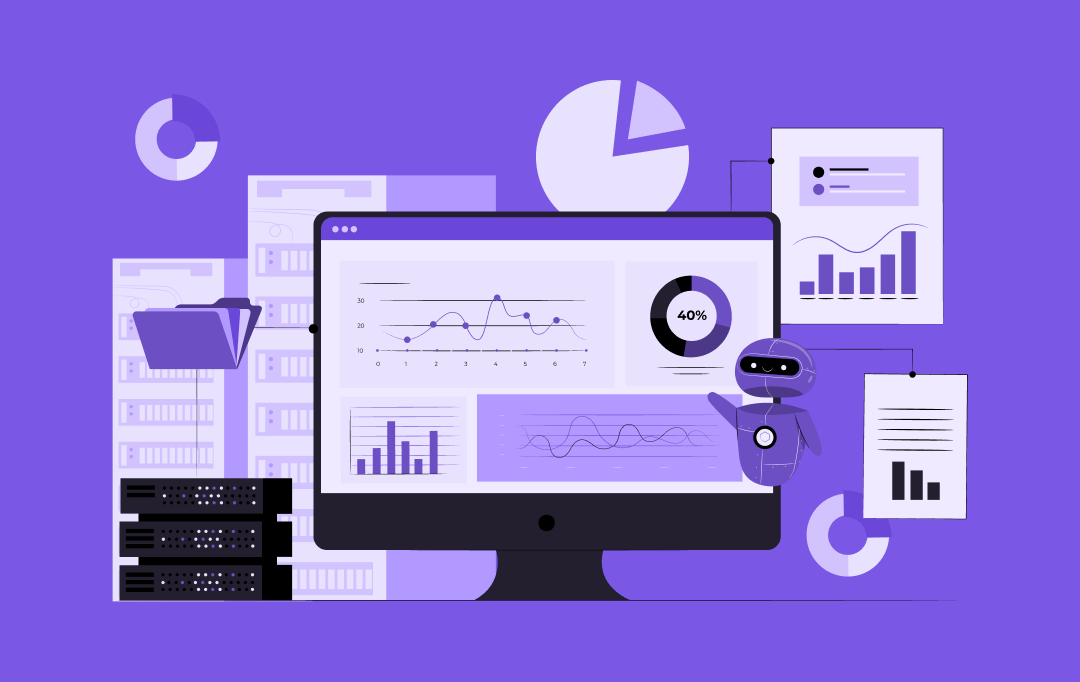
Exploring the Power of AI in Creating Dynamic & Interactive Data Visualizations
Key takeaways: AI transforms data visualization by providing automated insights, interactive dashboards, and NLP, thereby tackling revenue loss and improving data quality. Key features include predictive analytics, real-time data integration, and user-friendly visualizations, enabling faster and more informed decisions. Top 2025 tools, such as Tableau, Power BI, and Julius AI, offer NLP and real-time analytics…
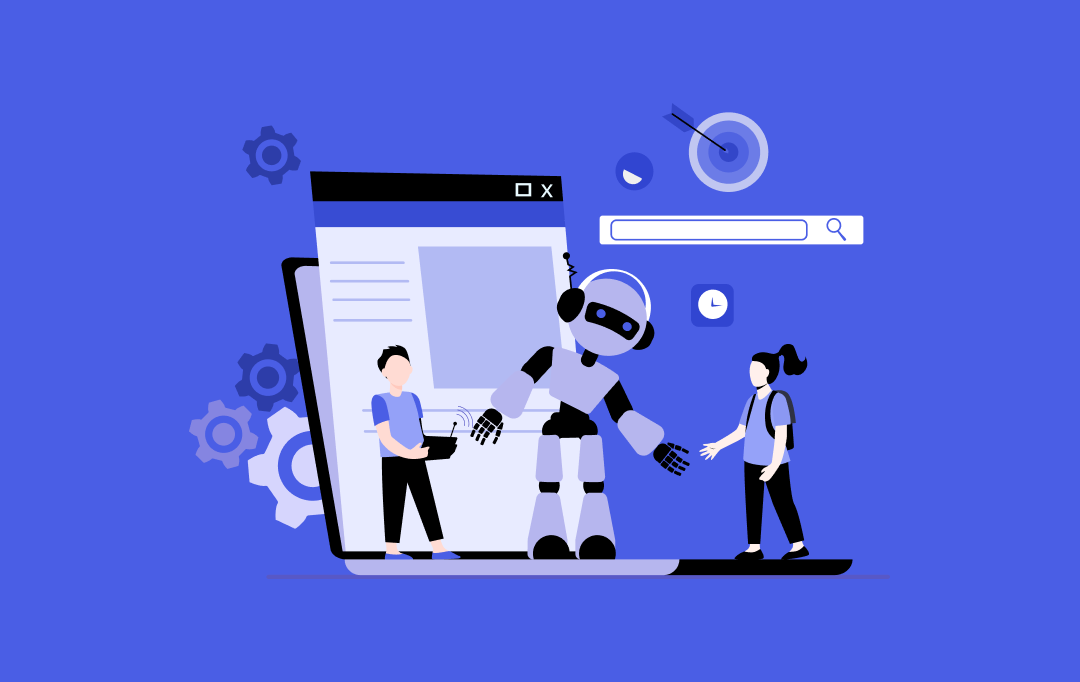
Practical Applications of AI as a Service for Your Business
Key takeaways: AIaaS enables fast, infrastructure-free AI adoption. Used across industries for automation and insights. Real-world examples show proven business impact. Pilot-first approach ensures smooth implementation. Key challenges include data, cost, and scaling. Trends include ethical AI, edge, and SME growth Imagine being able to cut down your operational costs while simultaneously improving decision-making and…







